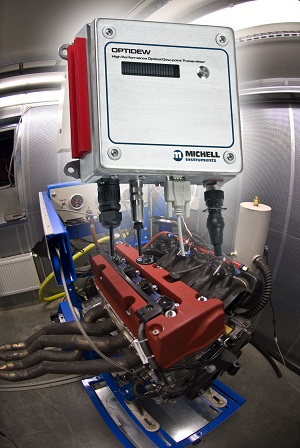Recent tests carried out on Michell’s Optidew Chilled Mirror Hygrometer confirm that it meets the Code of Federal Regulations for Engine Testing: an essential requirement for any instrument used for emissions testing in the US and many other regions.

The code (CFR Title 40, Part 1065, Engine Testing Procedures) sets out a number of criteria that humidity measurement instruments must meet, and Michell’s Optidew Hygrometer exceeds each of these:
- the Optidew has an accuracy of ±0.2°C – twice better than the required dew-point accuracy of ±0.5°C
- the Optidew has a repeatability of 0.1°C – five times better than the required repeatability of 0.5°C
- the Optidew updates its digital outputs every 5 seconds, or 0.2Hz twice as frequent as the required data update frequency of 0.1Hz, or once every 10 seconds
- the Optidew consistently has less than 0.008°C noise on its outputs. The maximum output noise level is 0.02°C
- the complete system rise and fall time, which is the time taken for the sensor to heat or cool from 10% to 90% of its range, should be no more than 50 seconds – the Optidew has a total rise/fall time of less than 45 seconds.
This industrial chilled mirror hygrometer combines the accuracy and integrity of a laboratory hygrometer with an instrument which is robust enough to survive in a tough industrial environment. The rugged 316 stainless steel NEMA 4 / IP66 wall mount enclosure is suitable for installation in an engine test room, while the remote sensor can be mounted directly into the engine air-intake ducting.
The Optidew gives reliable results every time because it measures a primary characteristic of moisture – the temperature at which condensation forms on a surface. With no calculated variables that can shift over time, the Optidew is ideal for monitoring engine test cell inlet air where consistency of measurements and long-term reliability are vital.
All vehicles with petrol or diesel engines require emissions testing – this includes cars, motorcycles, locomotive engines and many others – but even powered tools, for example lawnmowers and chain saws, need to undergo the same kinds of tests. Engine tests ensure that their emissions meet the current standards to protect the environment and prevent pollution. While the exhaust gases are typically checked for concentrations of carbon monoxide, hydrocarbons, nitrogen oxides, formaldehyde and particulate matter, precise measurements of the humidity and temperature of the air in the engine intake is vital for the accuracy of the tests. This is particularly important for applying a correction factor to the measured concentration of nitrogen oxides which is influenced by the inlet humidity and temperature.